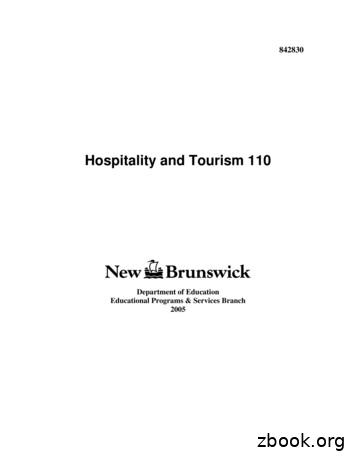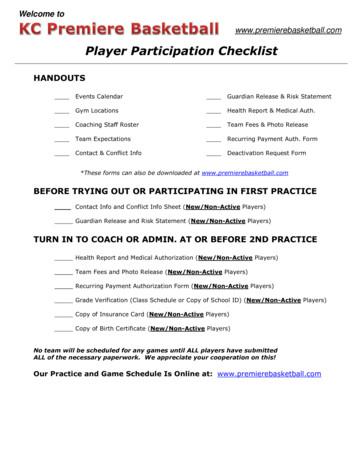Hospitality Administration - Program Mission, Goals, Core Values And .
Hospitality Administration - Program Mission, Goals, Core Values and Learning Outcomes. The Mission of the Hospitality Administration program of Ivy Tech, Indiana’s Community College is to offer accessible, affordable, world-class education and adaptive learning. We empower our students to achieve their hospitality related career and transfer aspirations. We embrace the college vision of economic transformation inspired by the education and earnings attainment of our citizens, the vitality of our workforce, and the prosperity of our unique and diverse communities. Our Core Values: Student-Centered Outcome-Driven Inclusive Collaborative Trustworthy and Transparent Goal #1 is Student Success: To engage all students so they successfully launch or expand their careers, or educational opportunities upon certificate or degree completion in Hospitality (Hotel and Restaurant) Management, Culinary Arts, Baking & Pastry Arts, Entrepreneurship, Event Management, Beverage Management or Dietary Management. Certificates and Degrees in the Hospitality Administration program lead to industryrecognized credentials that elevate student resumes, providing evidence-based outcomes that are verified by third-party certifications from the following Hospitality related accrediting bodies and industry organizations: Certified Hospitality Graduate- ACPHA (Accrediting Commission for Programs in Hospitality Administration http://www.acpha-cahm.org/ ServSafe Food Protection Manager Certification- NRAEF (National Restaurant Association Education Foundation) Certified Culinarian- American Culinary Federation Education ualityPrograms/ACF/Education/Quality/ Certified Pastry Culinarian- American Culinary Federation Education ualityPrograms/ACF/Education/Quality/ ManageFirst Professional Designation- National Restaurant Association Education Foundation- https://managefirst.restaurant.org/ Certified Dietary Manager- ANFP (Association of Nutrition and Foodservice Professionals) - https://www.cbdmonline.org/
Ivy Tech Community College Hospitality Administration Certificates and Degrees are comprised of a common body of General Education learning outcomes, Hospitality specific Professional-Technical learning outcomes, Hospitality specific concentration, and elective learning outcomes as follows: Hospitality Administration - Program General Education Learning Outcomes: o Demonstrate critical and creative thinking o Recognize and understand cultural and individual differences, in terms of both contemporary and historical perspectives o Recognize and understand social, political, civic, and environmental responsibilities related to our society o Apply basic scientific concepts in a variety of settings o Communicate effectively in written, oral and symbolic forms o Exhibit quantitative literacy o Apply ethical reasoning o Demonstrate the acquisition and use of information Hospitality Administration - Program Professional-Technical Learning Outcomes: o Introduction to the Hospitality Industry:- HOSP 102 Develop an understanding of the hospitality industry and career opportunities in the field. Identify the organizational structure and basic functions of departments within hospitality and foodservice establishments. o Sanitation and Safety: HOSP 101 Develop an understanding of the basic principles of sanitation and safety and to be able to apply them in the foodservice operations. Reinforce personal hygiene habits and food handling practices that protects the health of the consumer. o Food Preparation: HOSP 102 Practice and demonstrate skills and knowledge required of professional culinarians and apply them to commercial kitchen operations Develop skills in knife, tool and equipment handling and apply principles of food preparation to produce a variety of food products. o Nutrition: HOSP 104 Describe the characteristics, functions, and food sources of the major nutrients and how to maximize nutrient retention in food preparation and storage. Apply the principles of nutrient needs throughout the life cycle to menu planning and food preparation. o Beverage Management: HOSP 207
Become familiar with varieties of alcoholic and non-alcoholic beverages. Develop an appreciation for wine and food affinity. Explain laws and procedures related to responsible alcohol service. o Business and Math Skills: HOSP 102, HOSP 105, HOSP 201, HOSP 203 Perform mathematical functions related to foodservice operations. o Dining Room Management: HOSP 207 Perform dining room service functions using a variety of types of service. Demonstrate an understanding of quality customer service. o Environmental Sustainability: HOSP 101, HOSP 102, HOSP 201, HOSP 203 Demonstrate the importance of a variety of sustainability practices and be able to implement them in foodservice operations as a means for controlling operating costs and for being good environmental stewards. o Human Relations Management: HOSP 108 Prepare for the transition from employee to supervisor. Evaluate styles of leadership and develop skills in human relations and personnel management o Purchasing and Receiving: HOSP 201 Understand the overall concept of purchasing and receiving practices in quality foodservice operations. Apply knowledge of quality standards and regulations governing food products to the purchasing function. Receive and store food and non-food items properly. o Menu Planning: HOSP 203 Apply the principles of menu planning and layout to the development of menus for a variety of types of facilities and service. o Experiential Learning in Industry Setting: HOSP 280 Demonstrate the ability to meet the goals of a training plan in a coordinated externship experience in a hospitality setting o Hospitality and Restaurant Management: HOSP 280 Identify the dynamics of hospitality specific leadership and management activities that effectively engage work teams in successful hospitality operations. o Hospitality Administration - Program Student Learning Outcomes-Culinary Arts Concentration: o Food Preparation: HOSP 102 Practice and demonstrate skills and knowledge required of professional culinarians and apply them to commercial kitchen operations Develop skills in knife, tool and equipment handling and apply principles of food preparation to produce a variety of food products. o Advanced Food Preparation: HOSP 103, HOSP 106, HOSP 200, HOSP 210, HOSP 211, HOSP 212
Develop advanced food preparation skills and techniques that include Garde Manger, meat and seafood fabrication Demonstrate classic, contemporary and global cooking techniques in a live operational setting Demonstrate the ability to work in a professional kitchen as a prep, line and pantry cook o Basic Baking: HOSP 105, HOSP 213 Apply the fundamentals of baking science to the preparation of a variety of products. Use and care for equipment normally found in the bakeshop or baking area o Hospitality Administration - Program Student Learning Outcomes-Baking and Pastry Arts Concentration: o Food Preparation: HOSP 102 Practice and demonstrate skills and knowledge required of professional culinarians and apply them to commercial kitchen operations Develop skills in knife, tool and equipment handling and apply principles of food preparation to produce a variety of food products. o Basic Baking: HOSP 105 Apply the fundamentals of baking science to the preparation of a variety of products. Use and care for equipment normally found in the bakeshop or baking area o Advanced Baking, Pastry and Confections: HOSP 111, HOSP 113, HOSP 208, HOSP 209, HOSP 230, HOSP 231, HOSP 232, HOSP 270 Practice and demonstrate skills and knowledge required of a professional pastry culinarian and apply them to commercial kitchen operations Develop skills in more advanced decorating techniques and more complex preparations of pastry, confections, cakes, specialty cakes, wedding cakes and dessert composition Demonstrate bakery merchandising techniques and strategies for successful bakery operations o Hospitality Administration - Program Student Learning Outcomes-Entrepreneurship: ENTR 101, ENTR 105, ENTR 201, ENTR 205, ENTR 210, ENTR 250 o Demonstrate appreciation of entrepreneurship and its importance to the planning and implementation of small business ideas and innovations o Demonstrate knowledge of market research, venture growth and development
o Demonstrate knowledge of financial management, tax and finance for entrepreneurship o Hospitality Administration - Program Student Learning Outcomes-Event Management: o Introduction to the Hospitality Industry: HOSP 102, HOSP 114 Develop an understanding of the hospitality industry and career opportunities in the field. Identify the organizational structure and basic functions of departments within hospitality and foodservice establishments. o Sanitation and Safety: HOSP 101 Develop an understanding of the basic principles of sanitation and safety and to be able to apply them in food-service operations. Reinforce personal hygiene habits and food handling practices that protects the health of the consumer. o Food Preparation: HOSP 102 Practice and demonstrate skills and knowledge required of professional culinarians and apply them to commercial kitchen operations Develop skills in knife, tool and equipment handling and apply principles of food preparation to produce a variety of food products. o Dining Room Management: HOSP 207 Perform dining room service functions using a variety of types of service. Demonstrate an understanding of quality customer service. o Convention and Meeting Planning and Management: HOSP 171, HOSP 271 Develop and understanding of meeting planning and meeting management in convention and event settings Understand common terms used in meeting planning and meeting management o Special Event Management: HOSP 173 Define common terms used in event management activities Develop an understanding of unique needs of special events Understand current trends and best practices in special event management Plan and execute special events in hospitality settings o Catering Administration: HOSP 221 Define terms relevant to the catering industry Demonstrate knowledge of budget planning and timeline management for catered events Plan, prepare for and execute catered events o Hospitality Administration - Program Student Learning Outcomes-Beverage Management: HOSP 151, HOSP 152, HOSP 153, HOSP 251, HOSP 253
o Develop an understanding and appreciation for beer, wine and spirits and the production process o Practice sensory analysis through food and beverage tasting o Demonstrate knowledge of liquor liability laws and responsible beverage service o Hospitality Administration - Program Student Learning Outcomes-Dietary Management: HOSP 101, HOSP 104, HOSP 115, HOSP 116, HOSP 117, HOSP 118, HOSP 278 o Demonstrate knowledge of the science of nutrition and the human body o Develop an understanding of best practices of food production including the role of safety and sanitation, cost controls and supervision o Demonstrate the ability to meet the goals of a training plan in a coordinated externship experience in a dietary management setting
Demonstrate the ability to meet the goals of a training plan in a coordinated externship experience in a hospitality setting o Hospitality and Restaurant Management: HOSP 280 Identify the dynamics of hospitality specific leadership and management activities that effectively engage work teams in successful hospitality operations.
3. Hospitality Services III—Course Code: 992104 4. Hospitality Services IV—Course Code: 992105 Course Description: Hospitality Services I. This course introduces students to the hospitality and tourism industry and identifies some of the current and future trends affecting the hospitality and tourism industry and the impact this
Hospitality & Tourism 110 GCO 1 Introduction to the Hospitality and Tourism Industry Specific Curriculum Outcomes: Students will be expected to: identify what hospitality and tourism is and why it is the largest industry in the world. be the guests and experience true hospitality. outline the history of the hospitality and tourism industry
completion in Hospitality (Hotel and Restaurant) Management, Culinary Arts, Baking & Pastry Arts, Entrepreneurship, Event Management, Beverage Management or Dietary Management. Certificates and Degrees in the Hospitality Administration program lead to industry-recognized credentials that elevate s
Hospitality Leadership Through Learning www.chr.cornell.edu Cornell Hospitality Proceedings Vol. 4 No. 20 1992 - 2 0 1 2 th ANNIVERSARY The Intersection of Hospitality . Chris Proulx, CEO, eCornell & Executive Education Cyril Ranque, SVP, Global Market Management, Expedia, Inc. Carolyn D. Richmond, Partner, Hospitality Practice, Fox
Shawnee Mission, KS 66219 Pawnee Elementary School 9501 W. 91st St. Shawnee Mission, KS 66212 Prairie Elementary School 6642 Mission Rd. Shawnee Mission, KS 66208 Santa Fe Trail Elementary School 7100 Lamar Shawnee Mission, KS 66204 Shawnee Mission East High School 7500 Mission Rd. Shawnee Mission, KS 66208 Shawnee Mission North High School
187 Handout: Hospitality/Culinary Career Bridge Semester 1 Goals and Course Descriptors 189 Week 9, Lesson 2 193 Handout: Self-Assessment for Hospitality/Culinary Career Bridge Semester 1 195 Handout: "I Believe" Statements on Providing Student Support 197 Week 9, Lesson 3 201 Week 9, Lesson 4 Theme: The Hospitality/Culinary Customer
The Hospitality and Tourism Management Program is fully aligned with the Common Core State Standards and the national Hospitality & Tourism Career Cluster frameworks. Hospitality and Tourism Management Program (HTMP) Year 2 Chapter Sections Recommended hours needed to teach chapter Unit 1: Introduction to Leadership and Management
National factors – political issues, level and type of government support for business, taxation, the economy, e.g. level of employment, inflation, exchange rates, cost of loans Local factors – location of business, requirements for resources, e.g. premises, staff, equipment, location of suppliers, competitors and customers























